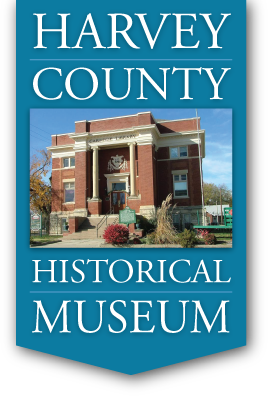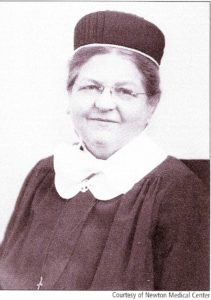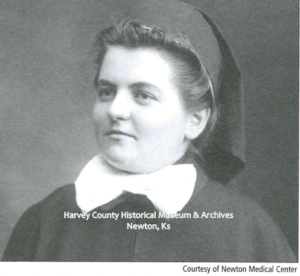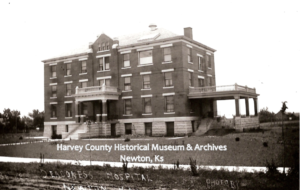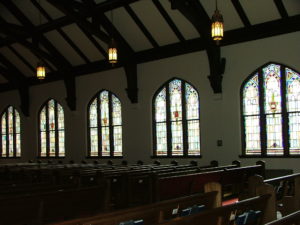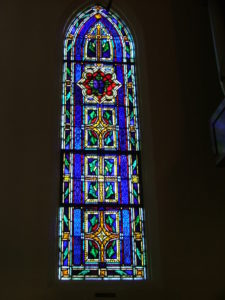by Kristine Schmucker, HCHM Curator
We continue to feature fabulous women of Harvey County as part of Women’s History Month. Women were leaders in Harvey County health care. Previous posts have featured Dr. Lucine Axtell at Axtell Christian Hospital and Sister Anna Gertrude Penner Harvey County’s first Public nurse. At Bethel Deaconess Hospital, Sister Frieda Kaufman shaped the institution and influenced many lives.
On May 27, 1942, Sister Frieda Kaufman received the Honorary Degree of Doctor of Humane Letters from Bethel College for her lifelong work as a deaconess and ‘sister-in-charge’ of the Bethel Deaconess Home and Hospital in Newton, Ks. Sister Frieda was the first Mennonite woman to receive an honorary degree from a Mennonite institution of high learning. After the ceremony for the conferment of the degree, Sister Frieda returned alone to the sisters’ home and later that day “a friend found her on her knees washing the floor.”
Known to most people in the community as “Sister Frieda,” she was the driving force behind the Bethel Deaconess Home and Hospital and the deaconess program in the Mennonite Church.
Early Life
Frieda was born in Haagen, in Wiesental, Baden, Germany on October 23, 1883, the ninth child born to John and Marie (Egle) Kaufman and one of three that lived to adulthood. As a child, Frieda attended a schools run by Lutheran deaconess and later Catholic nuns. Years later, she recalled her childhood affinity with the deaconess and nuns, noting“the desire of her heart to become a sister did not disappear” as she got older.
At the age of 8, Frieda with her family migrated to the U.S. After a long, difficult journey the Kaufman family arrived in Halstead, Ks on July 2, 1892. Their transition to life on the prairie was made easier by members of their extended family already living in south central Kansas. Frieda did not forget the “desire of her heart.”
“The Desire of Her Heart”
In the late 1890s, Rev. David Goerz, Newton, Ks, was exploring the possible ways for women to serve within the structure of the Mennonite Church. He was interested in the deaconess programs within Lutheran churches and considering such a program for the Mennonite Church. The idea of deaconesses was rooted in early Christianity as a way for unmarried women or widows to voluntarily care for the poor and sick in the community. The word “deaconess” comes from the Greek word diakonia which meant “faith active in love and service to all.” In the late 1800s, the idea of deaconesses was popular among Protestant churches. Under the leadership of Goerz, the idea of deaconesses in the Mennonite Church gained popularity. In Frieda Kaufman, Rev. Goerz found the first young woman interested in dedicating her life to the work.
In August 1902, Frieda began at training the Interdenominational Deaconess Home & Hospital in Cincinnati. During training, she lived at the hospital and was expected to work twelve hour shifts in addition to attending classes and keeping up with assignments. She completed her training and returned to Kansas in 1904. She started working at Bethesda Hospital & Home in Goessel, Ks, and in private homes in the area.
On June 11, 1908, the Bethel Deaconess Home & Hospital, located on south Pine in Newton, was dedicated and the first three Mennonite deaconesses in America were ordained, Sisters Frieda Kaufman, Catherine Voth and Ida Epp. At the age of twenty-five, Sister Frieda was appointed deaconess mother and superintendent of the hospital in addition to her nursing duties. She also taught and oversaw the nurses’ training school at Bethel Deaconess Hospital.
Throughout the early years most of the work at the hospital was performed by the deaconesses. Although some were trained RNs, like Sister Frieda, all helped with housekeeping and laundry. As deaconess mother, Sister Frieda oversaw the day-to-day activities of the hospital. The deaconesses lived at the hospital and they did not receive payment for their work. Instead, the hospital met their needs and provided a small monthly allowance for personal items.
“A Very Precise Individual”
Over the next twenty years, the administration of the hospital would take more of Kaufman’s time as the institution grew. Until 1943, Sister Frieda was a constant, driving force for both the hospital and home, as well as the deaconess cause within the Mennonite Church.
Sister Frieda was described as a “short and somewhat overweight” woman and “she had to puff a little upon excretion. Her countenance was always very pleasant.” Sister Theodosia Harms, who lived and worked with Sister Frieda for years, noted Sister Frieda had a reputation as being a “very precise individual, anything that had to be done, had to be done perfect,” and she expected this of herself as well as others. Nursing students remember that her office door was always open.
In the community, she was an active member at 1st Mennonite Church, 429 East 1st, Newton. Her influence can be seen in the stain glass windows of church built in 1932. She viewed the art-glass windows as a”reverential necessity.”
On August 7, 1944, at the age of sixty, Sister Frieda Kaufman passed away due to complications from diabetes and a heart condition. She was buried in the Bethel Sister Family lot at Greenwood Cemetery, Newton Ks.
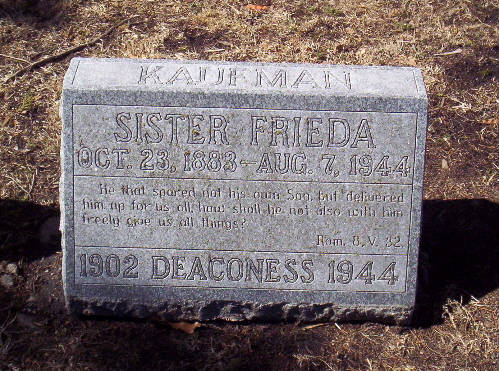
With almost single minded purpose Sister Frieda Kaufman became a deaconess and spent the rest of her life encouraging other women to join her in the work. She enjoyed people, which contributed to her success as a nurse. She could have been a nurse without becoming a deaconess. She chose to become a deaconess — she saw it as a way of life.
Sources:
This post is condensed from a longer biography of Sister Frieda Kaufman by Kristine Schmucker, 1991.
- Sister Frieda Kaufman’s papers which include correspondence, articles written by Sister Frieda and diaries are located at the Mennonite Library & Archives, Bethel College, North Newton, Ks.
- Sister Theodosia Harms, interview by Marilyn Schmidt, “Portraits: Theodosia Harms, Agnes Lorentz and Anna Marie Goertz.” Kansas Collection, video cassette produced by the Newton Public Library, Newton, Ks, n.d.
- Lamps on the Prairie: A History of Nursing in Kansas complied by the writers’ program of the Works Projects Administration, State of Kansas. Emporia, Ks: Emporia Gazette Press, 1942.
- Barrett, Lois. The Vision and the Reality: the Story of Home Missions in the General Conference Mennonite Church. Newton, Ks: Faith & Life Press, 1983.
- Dietzel, Ron and Robert Schrag, ed. Mission & Memory: 125th Anniversary First Mennonite Church of Newton, 1878-2003. Historical Committee, 2003.
